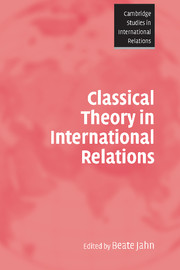Book contents
- Frontmatter
- Contents
- Notes on contributors
- Acknowledgements
- 1 Classical theory and international relations in context
- Part I Intellectual contexts
- Part II Political contexts
- Part III Lineages
- 9 The ‘other’ in classical political theory: re-contextualizing the cosmopolitan/communitarian debate
- 10 Images of Grotius
- 11 The Hobbesian theory of international relations: three traditions
- 12 Re-appropriating Clausewitz: the neglected dimensions of counter-strategic thought
- Index
- CAMBRIDGE STUDIES IN INTERNATIONAL RELATIONS
9 - The ‘other’ in classical political theory: re-contextualizing the cosmopolitan/communitarian debate
Published online by Cambridge University Press: 22 September 2009
- Frontmatter
- Contents
- Notes on contributors
- Acknowledgements
- 1 Classical theory and international relations in context
- Part I Intellectual contexts
- Part II Political contexts
- Part III Lineages
- 9 The ‘other’ in classical political theory: re-contextualizing the cosmopolitan/communitarian debate
- 10 Images of Grotius
- 11 The Hobbesian theory of international relations: three traditions
- 12 Re-appropriating Clausewitz: the neglected dimensions of counter-strategic thought
- Index
- CAMBRIDGE STUDIES IN INTERNATIONAL RELATIONS
Summary
Introduction
The current debate over the ethics of international relations focuses upon the following issue: can and should political obligation be extended to citizens in other communities? Within this debate, a ‘cosmopolitan’ position, referring back to Immanuel Kant's notion of the pre-social universal self, holds that a global principle of justice, backed up by an institutionalized system of democratic global governance, is both necessary and desirable in an increasingly interdependent world. Against this, a ‘communitarian position’, often in some way referring back to Georg Hegel's notion of the socially-constituted self, points out that not only is there no such institutional capacity in world politics to organize global justice, but furthermore, there can be no a priori principle of justice because political rights and duties are always embedded in a community-dependent value system. Essentially, then, two classical authors, Kant and Hegel, have consistently been mobilized as authorities through which to frame the cosmopolitan/communitarian debate in the following terms: either there ought to be a universal justice system, or we should accept what is, namely, an array of self-referential value systems.
Some have questioned the framing of the debate around an ethical dichotomy of either pursuing what ‘ought to be’ or accepting what ‘is’. And such concerns have increasingly become expressed (although by no means exclusively) through a broadly poststructuralist understanding of the relationship between identity and difference. Here, the cosmopolitan/communitarian dichotomy is understood in terms of the philosophical discourse of the ‘modern’ or ‘Western’ subject.
- Type
- Chapter
- Information
- Classical Theory in International Relations , pp. 207 - 232Publisher: Cambridge University PressPrint publication year: 2006
- 2
- Cited by



